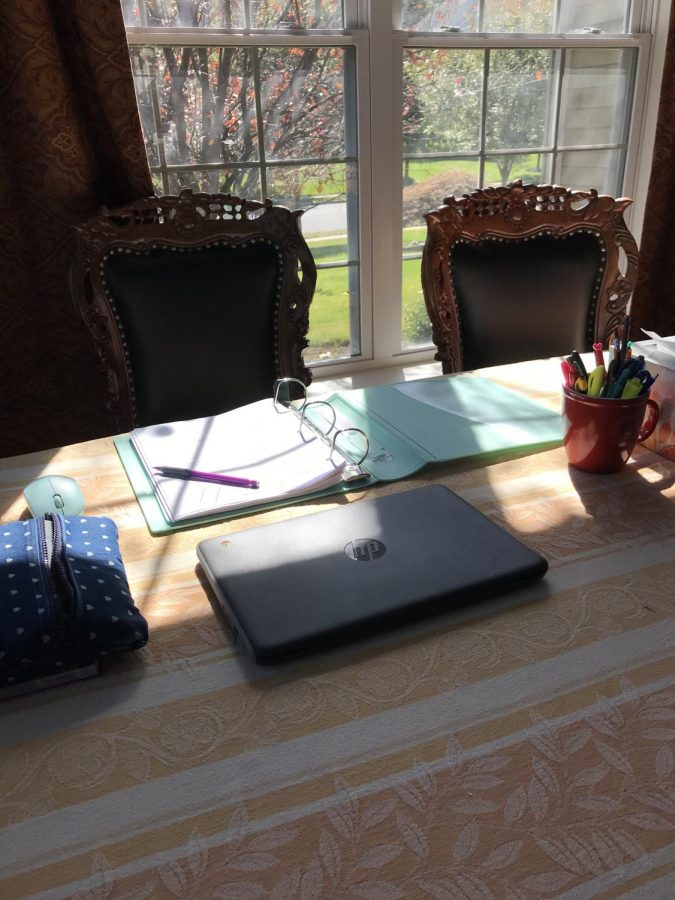Hybrid vs. Remote Learning
Ever since the COVID-19 pandemic spread through the United States, the way that we went about our day-to-day activities took a dramatic change, and with change comes adjustment. Since March, we’ve mastered online shopping, gotten used to FaceTiming or Zoom calling our friends, and made sure that we socially distanced while wearing masks in public places. However, one big issue that still requires a tremendous adjustment is attending school: hybrid or remote.
Since the start of my freshman year, I have been hybrid–I attend school one day and am remote the next. Personally, I don’t feel like I’m getting the full high school experience. When my older sisters went to Lenape, they would eagerly talk about spirit week, homecoming, and all the exciting activities to participate in as a freshman. I feel like I’m missing out on what would have been a fun first year of high school, but at least I have the option to go to school and see most of my teachers. Other hybrid students feel similarly as well. Maddie Reick, a freshman, says that hybrid learning is going to be an “adjustment for people who loved going to school and loved the school environment.” However, she has a positive outlook when comparing the switch from all remote last year to hybrid learning this year, and how we’ll adapt just like we did before.
When comparing classes, Kasey Thomas, a freshman, claims, “Some classes are a lot harder or difficult to focus in while others barely changed.” I agree with both Maddie and Kasey about hybrid learning differing from school pre-COVID, and that is an adjustment we’ll have to make.
Although hybrid learning has its downfalls, it has a positive side as well. Senior, Lexie Kahn says, “I love being able to go into school and actually interact with my teachers and classmates in person.” Lexie makes a good point on how hybrid learning allows students to physically be in school and socialize with teachers and peers. Students who like this aspect of school can still meet their needs with hybrid learning. She also provides an optimistic response when asked a few weeks ago about how she felt about going from hybrid to remote that week: “Without having to travel to and from school every other day, I am able to work on college applications after the school day ends.” Yes, school closure is never a good thing, but at least we will have more time to complete work and enjoy some free time.
Unfortunately, school closure caused “the ending of sports,” a topic that Kasey mentioned and is “pretty upset about.” Many of Lenape’s sports seasons were already cut short due to the pandemic, but they had to be shortened even more after closing the school. I played tennis for Lenape this year, and as Lexie says, I am thankful that the “tennis season ended before the email came out.” I am very sorry for the seniors who could not finish their sports seasons, but it’s amazing how far along we got with it.
On the other hand, remote learners had a few opinions to share about the virtual side of things. Parita Bhanot, a freshman, says that it “allows me to get extra time to sleep in the morning, even if it’s just by a few minutes.”
Praveen Prabaharan, a freshman, also makes a point about school safety: “even though you don’t get as much of the school experience as hybrid learners, it will help us get back to the full experience faster.” School needs to be a place where everyone can feel safe, and in times like this, it’s not completely safe. That is why remote learning “keeps students from having to be exposed to others during the pandemic,” a remark made by Arti Singh, a junior.
Arti also comments on technological obstacles and provides an inspiring response: “There can be a bit of a communication barrier through Google Meet, but I think if you’re motivated enough to complete your work, take the initiative to communicate your concerns with teachers.” Communicating with teachers remotely can be difficult, but everyone is going through similar problems, and we’re all finding our way around it.
Frankly, when I asked a few hybrid and remote students to write a couple of sentences on how they felt about their way of learning, I only expected them to give me 2 or 3 sentences of opinions. But when I got back entire paragraph responses to my question, I was shocked that they had so much to say about their current school experience. It was a great opportunity to get a chance to hear other people’s opinions, and it’s amazing to see how much they wanted to voice them. As we heard from a few of our classmates, there are many ups and downs to hybrid and remote learning. Now, it’s up to us to move forward and try our best in these difficult times.


